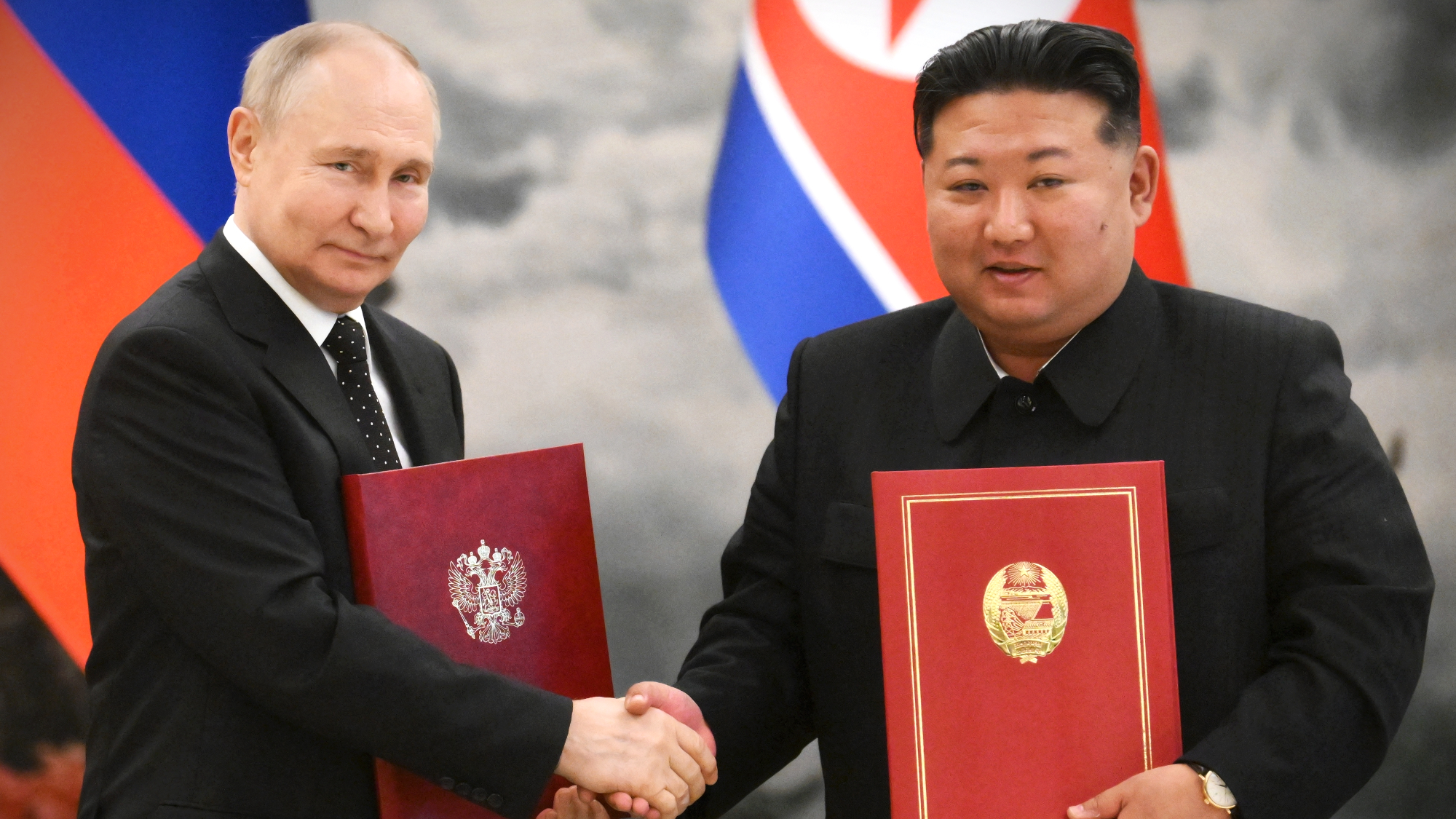Russia and North Korea sign mutual defense pact
Vladimir Putin and Kim Jong Un pledged assistance if either country faced foreign "aggression"


A free daily email with the biggest news stories of the day – and the best features from TheWeek.com
You are now subscribed
Your newsletter sign-up was successful
What happened
Russian President Vladimir Putin and North Korean leader Kim Jong Un signed an agreement Wednesday pledging some sort of mutual assistance if either country faced foreign "aggression." The pledge appears to be the strongest since the collapse of the Soviet Union ended a 1961 pact that required Moscow to step in if North Korea were attacked.
Who said what
Kim said the agreement, signed during Putin's first visit to North Korea since 2000, was the "strongest treaty ever" between Moscow and Pyongyang. Putin said the "breakthrough" pact "does not exclude the development of military-technical cooperation" — a statement analysts said could mean he will reward Kim's flow of munitions for the Ukraine invasion by helping to improve North Korea's nuclear missiles and other advanced weapons.
The scope of the agreement was unclear. South Korean analyst Cheong Seong Chang told The Associated Press it appears the two hermit states have "completely restored their Cold War-era military alliance." Moscow and Pyongyang are declaring a "de facto alliance," Hudson Institute security analyst Patrick Cronin said to The Wall Street Journal, but "there is nothing fundamentally new about this relationship today that was not true before Putin's visit."
What next?
Putin arrived in Vietnam on Thursday to bolster ties with Moscow's longtime ally and demonstrate the "diplomatic support Russia still enjoys in the region," the BBC said.
The Week
Escape your echo chamber. Get the facts behind the news, plus analysis from multiple perspectives.

Sign up for The Week's Free Newsletters
From our morning news briefing to a weekly Good News Newsletter, get the best of The Week delivered directly to your inbox.
From our morning news briefing to a weekly Good News Newsletter, get the best of The Week delivered directly to your inbox.
A free daily email with the biggest news stories of the day – and the best features from TheWeek.com
Peter has worked as a news and culture writer and editor at The Week since the site's launch in 2008. He covers politics, world affairs, religion and cultural currents. His journalism career began as a copy editor at a financial newswire and has included editorial positions at The New York Times Magazine, Facts on File, and Oregon State University.
-
 Magazine solutions - February 27, 2026
Magazine solutions - February 27, 2026Puzzle and Quizzes Magazine solutions - February 27, 2026
-
 Magazine printables - February 27, 2026
Magazine printables - February 27, 2026Puzzle and Quizzes Magazine printables - February 27, 2026
-
 ‘The forces he united still shape the Democratic Party’
‘The forces he united still shape the Democratic Party’Instant Opinion Opinion, comment and editorials of the day
-
 ‘The forces he united still shape the Democratic Party’
‘The forces he united still shape the Democratic Party’Instant Opinion Opinion, comment and editorials of the day
-
 Trump links funding to name on Penn Station
Trump links funding to name on Penn StationSpeed Read Trump “can restart the funding with a snap of his fingers,” a Schumer insider said
-
 Trump reclassifies 50,000 federal jobs to ease firings
Trump reclassifies 50,000 federal jobs to ease firingsSpeed Read The rule strips longstanding job protections from federal workers
-
 Supreme Court upholds California gerrymander
Supreme Court upholds California gerrymanderSpeed Read The emergency docket order had no dissents from the court
-
 700 ICE agents exit Twin Cities amid legal chaos
700 ICE agents exit Twin Cities amid legal chaosSpeed Read More than 2,000 agents remain in the region
-
 Trump demands $1B from Harvard, deepening feud
Trump demands $1B from Harvard, deepening feudSpeed Read Trump has continually gone after the university during his second term
-
 House ends brief shutdown, tees up ICE showdown
House ends brief shutdown, tees up ICE showdownSpeed Read Numerous Democrats joined most Republicans in voting yes
-
 Trump’s Kennedy Center closure plan draws ire
Trump’s Kennedy Center closure plan draws ireSpeed Read Trump said he will close the center for two years for ‘renovations’
